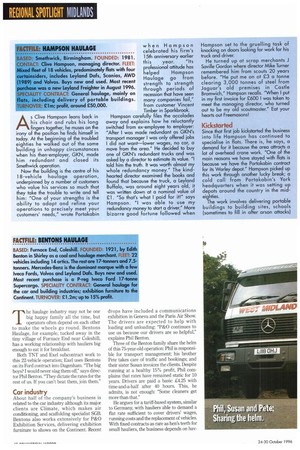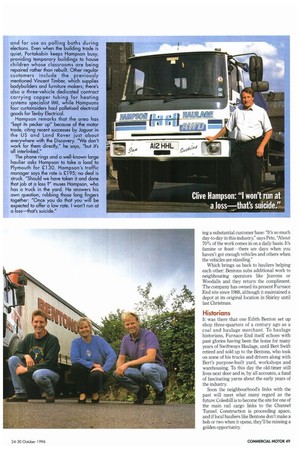T he haulage industry may not be one big happy family
Page 50

Page 51

If you've noticed an error in this article please click here to report it so we can fix it.
all the time, but operators often depend on each other to make the wheels go round. Bentons Haulage, for example, tucked away in the tiny village of Furnace End near Coleshill, has a working relationship with hauliers big enough to eat it for breakfast.
Both TNT and Exel subcontract work to this 22-vehicle operation; Exel uses Bentons on its Ford contract into Dagenham. "The big boys? I would never slag them off," says director Phil Benton. "They dictate the rates for the rest of us. If you can't beat them, join them."
About half of the company's business is related to the car industry although its major clients are Climate, which makes air conditioning, and scaffolding specialist SGB. Bentons also works extensively for P&O Exhibition Services, delivering exhibition furniture to shows on the Continent. Recent drops have included a communications exhibition in Geneva and the Paris Air Show. The drivers are expected to help with loading and unloading: "P&O continues to use us because our drivers are so helpful," explains Phil Benton.
Three of the Benton family share the helm of this 75-year-old operation: Phil is responsible for transport management his brother Pete takes care of traffic and bookings; and their sister Susan invoices the clients. Despite running at a healthy 15% profit, Phil complains that rates have remained static for 10 years. Drivers are paid a basic £4.25 with time-and-a-half after 40 hours. This, he admits, is not enough: "Some cleaners get more than that."
He argues for a tariff-based system, similar to Germany, with hauliers able to demand a flat rate sufficient to cover drivers' wages, running costs and the replacement of vehicles. With fixed contracts as rare as hen's teeth for small hauliers, the business depends on hay ing a substantial customer base: "It's so much day-to-day in this industry," says Pete, "About 70% of the work comes in on a daily basis. Its famine or feast—there are days when you haven't got enough vehicles and others when the vehicles are standing."
Which brings us back to hauliers helping each other: Bentons subs additional work to neighbouring operators like Jeavons or Woodalls and they return the compliment. The company has owned its present Furnace End site since 1988, although it maintained a depot at its original location in Shirley until last Christmas.
It was there that one Edith Benton set up shop three-quarters of a century ago as a coal and haulage merchant. To haulage historians, Furnace End itself echoes with past glories having been the home for many years of Swiftways Haulage, until Bert Swift retired and sold up to the Bentons, who took on some of his trucks and drivers along with Bert's purpose-built yard, workshops and warehousing. To this day the old-timer still lives next door and is, by all accounts, a fund of fascinating yarns about the early years of the industry.
Soon the neighbourhood's links with the past will meet what many regard as the future: Coleshill is to become the site for one of the main rail cargo links to the Channel Tunnel. Construction is proceeding apace, and if local hauliers like Bentons don't make a bob or two when it opens, they'll be missing a golden opportunity.




















































































































